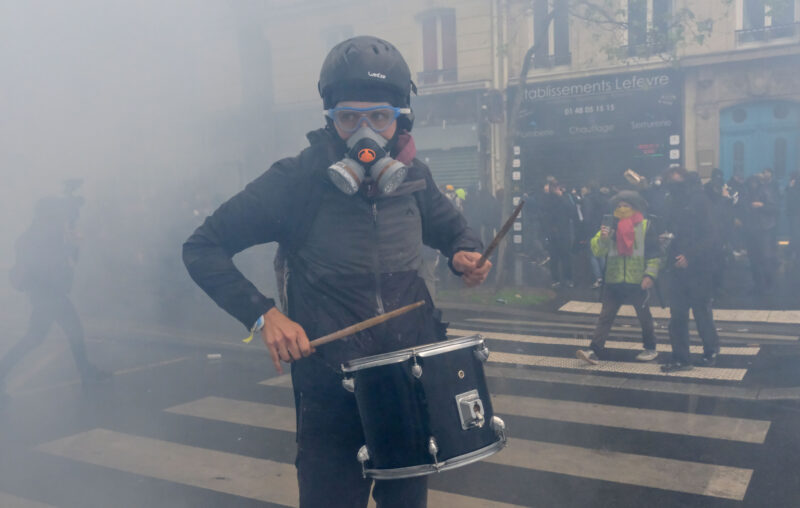Don’t Blame Video Games for France’s Riots

France has been rocked by riots since the June 27 fatal shooting of 17-year-old Nahel Merzouk by a police officer in Nanterre, a suburb of Paris. Perceived as an incident of police brutality, things have rapidly degenerated. According to the Interior Ministry, some 800 police officers have been injured and more than 3,000 persons have been arrested in the six nights following the beginning of the riots. In response to what is clearly the worst riots in France since 2005 – when two young Muslims were electrocuted in a metro station while running away from police officers – the national government has attempted to curtail the right to protest, while lower levels of government have banned the sale and transportation of gasoline at night.
In the midst of this turmoil, President Emmanuel Macron decided to make the somewhat strange assertion that violent video games played a “considerable role” in encouraging the riots. More precisely, he stated that youthful protesters sought to “imitate the violence” of the game to “escape reality” by “playing out their video games in the streets”.
This is a frequently reiterated argument. For example, pundits in the British media made a similar connection to the large riots of August 2011. It is also a connection that has repeatedly been shown, in peer-reviewed journals, not to exist or to be too weak to matter.
Let us review this evidence to better understand why, again, we can dismiss the type of deflection that President Macron is attempting to do.
First, it is necessary to understand that video games are linked with greater aggressive urges. This result can be found in multiple laboratory experiments where the brain activity of subjects is studied for reactions to violence. This “lab-based” result is present but somewhat debated.
However, let us assume that these “lab-based” results are true. Does it mean that they necessarily carry? Insights from economic theory suggest that, while valid, these results might lack real world relevance. Let me give you an example I often give to my students that mirrors the case at hand quite well: pesticides for food production and cancer rates.
I tell my students that there is incontrovertible evidence that there is a positive link in lab studies between exposure to pesticides and cancer risks. The range of effects varies, but no lab studies find that pesticides reduce cancer. However, I tell my students that this is not sufficient to know whether more or less pesticides are good or bad. Why? Because pesticides can reduce the price of food. In turn, lower food prices mean improved nutrition and lower rates of cancer. As long as the beneficial-health of lowering food prices caused by pesticides is greater than the detrimental effect of pesticides on health, pesticides could save lives.
The same thing is true with video games. First, people who play video games may choose to play video games to achieve some form of catharsis. They choose to have greater levels of aggressiveness in a controlled environment (i.e., their home) in order to vent. As a result, the baseline level of aggressiveness is displaced and constrained due a “catharsis effect.” Second, people who play video games are … well… busy playing video games. This means that they are somewhat incapable of committing crimes in the real world – something that is labelled as the “incapacitation effect.” Third, video games could be a substitute for a different form of venting by players. Indeed, people who feel the urge to cool down after a bad day can choose between going to a bar to drink or play video games. In the former case, they might binge and get into a fight. As such, there is a “substitution effect.”
These are all effects that economists would consider in analysing whether video games heighten violence as they can mitigate – or even fully vitiate – those found in laboratories. So, what happens when we try to see to what extent these effects matter ? Pretty much nothing!
For example, one study in the Southern Economic Journal used weekly crime data and retail sales data for the top 30 selling video games between 2005 and 2011. It found no evidence of heightened violence. Another study, published in Contemporary Economic Policy, found that gaming reduced crime. This is close to the modal finding in the literature.
There are some debates over effects on subsets of the population. For example, some studies find small effects of gaming on violence but they only matter in extreme gamers (who play more than 4 hours per day) and/or for adolescents. But even this narrowly-defined result is contested. For example, one study used high quality data on adolescent boys around the release dates of new video games. It found no effects on violence initiated by those within this narrow subset of the gaming population.
In sum, the effects are zero or even positive on average, while they may be small and negative for narrow sub-groups of the gaming population. This is hardly the basis to explain some of the worst riots in the history of France since the Second World War!
If President Macron wants to deflect blame, he should look somewhere else.










